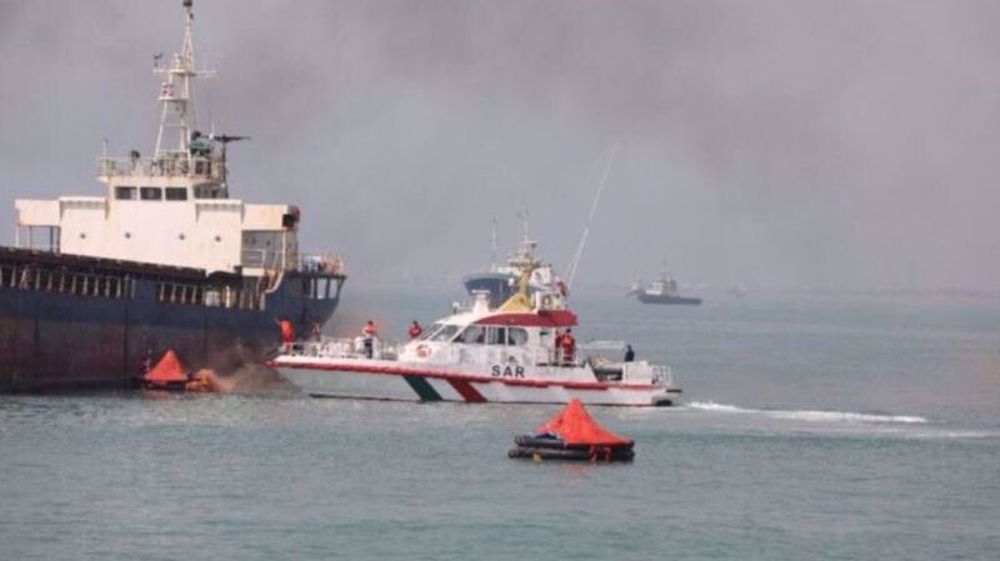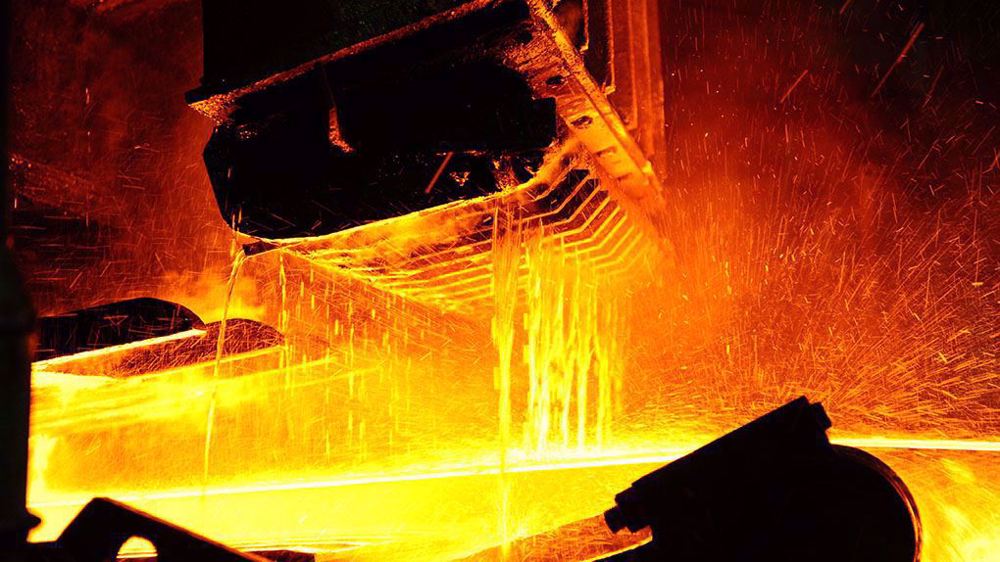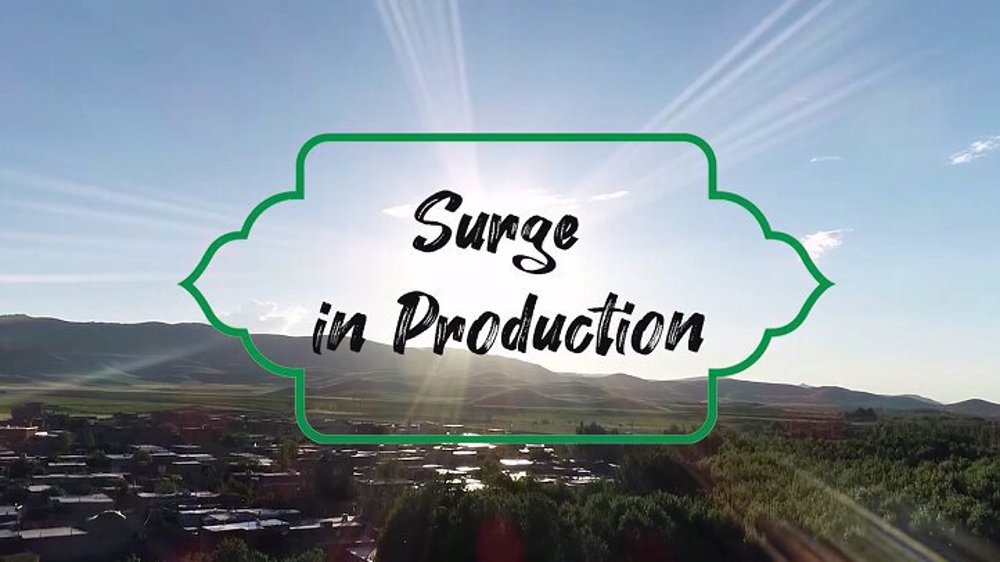Minister: Iran to hit record 52 million tonne in steel production soon
Iran will hit soon a plateau of 52 million tonnes in steel production, its mine, industry and trade minister says, days after the outgoing Trump administration hit the sector with new sanctions.
The Islamic Republic has sought to boost the steel sector under its plan to increase non-oil revenues. It has succeeded in adding steel capacity which currently stands at 30 million tonnes a year.
“Iran will reach a production capacity of more than 52 million tonnes of steel in the near future,” Minister of Mine, Industry and Trade Alireza Razm-Hosseini said in his meeting with Iraqi Trade Minister Alaa Ahmed al-Jubouri in Tehran Wednesday.
The country aims to export 20 to 25 million tonnes of steel annually by 2025 when it expects to hit the vision target of 55 million tonnes.
However, political and logistical hurdles are high and the sector has had to battle the headwinds of the most intensive US sanctions unleashed in May 2019 when Washington targeted Tehran’s export revenues from its industrial metals.
At the time, President Donald Trump put world nations on notice against allowing Iranian steel and other metals into their ports, saying it would no longer be tolerated.
Earlier this month, the US Treasury Department imposed sanctions on several companies in connection with Iran's steel industry in a bid to dry up the resource-rich country’s sources of revenue.
A statement by the department said the US was targeting a China-based supplier of graphite electrodes, 12 Iranian metal producers and three foreign-based sales agents of a major Iranian metals and mining holding company.
The 12 Iranian steel manufacturers now designated by the US government have a combined annual output capacity that "reaches millions of metric tons of steel product," the Treasury said.
The steel sector accounts for 10 percent of Iran’s export economy, but it is largely insulated from the effects of the sanctions because it does not depend on foreign technology. Officials say the zero to 100 of a steel mill can now be designed and built in the country.
Moreover, there is a buoyant domestic market where more than 50 industries in Iran are linked to the construction industry which uses steel as a basic ingredient.
Steel is also the key component in Iran’s automotive industry which is the largest in the Middle East and North Africa. Iran further has a massive oil and gas profile and a sprawling transportation and water supply network that feeds on its domestic metal industry.
Alternative to oil industry
Iran’s metals sector is emerging as an alternative source of revenue because the country’s mammoth oil industry is under a strict sanctions regime which has cut income.
The US has imposed sanctions on almost all aspects of Iran’s economy targeting the construction, manufacturing, textiles, mining, aluminum, copper, iron and steel industries. However, the mining industry is hard to sanction because of its immense diversity.
Iran holds about 7 percent of the world's proven mineral reserves estimated at 60 billion tonnes, which include 68 types of minerals. At current rates, Iranian mineral reserves are worth $700 billion which could translate to $4 trillion of revenues in added value, according to Deputy Minister of Industry, Mining and Trade Mehdi Karbasian.
Razm-Hosseini on Wednesday touched on Iran’s $8 billion in metal exports as well as a 400,000-tonne capacity established in copper production.
“Iran will reach a production capacity of more than 52 million tonnes of steel in the near future and in the next four years, it will be among the top 10 countries in copper production, and these capacities offer a suitable ground for deepening trade relations between Iran and Iraq,” he told Jubouri.
First regional export destination
The Iraqi minister arrived in Tehran Tuesday at the head of a high-ranking delegation to attend the fourth Joint Economic Committee meeting with Iran after a six-year hiatus.
Iran is one of Iraq’s biggest trading partners and the Arab country’s large consumer market is ideally suited to Iran’s non-oil trade plans.
However, their growing trade has faced pushbacks from the Trump administration which has been enlisting US companies and Washington's regional allies to replace the Islamic Republic as the key source of energy for Iraq.
The new diplomatic rendezvous in Tehran is deemed as a celebration of Trump’s imminent departure from the White House with a new push to buttress trade relations between Iran and Iraq.
Experts say the Iraqis are more than glad to see the back of Trump who made scuttling Tehran’s vital relationship with Baghdad a centerpiece of his aggressive policy.
Razm-Hosseini said Iraq ranks first for exports of Iran's exports to neighboring countries. "Iran seeks to expand and deepen trade with Iraq to boost exports," he said.
His ministry’s strategy, he said, is to expand exports to 15 neighboring countries - a goal which it fulfilled up to 70 percent in the current Persian year ending in March.
The minister announced Iran's readiness to hold specialized exhibitions in major Iraqi cities and cooperate with the country on industrial modernization and improvement.
He touched on Iranian producers’ great achievements in manufacturing home appliances under the sanctions, saying the field is also one of the suitable grounds for deepening cooperation between the two countries.
Iran is further interested in cross-border cultivation of wheat, barley and corn in Iraq, Razm-Hossein said.
“Given the appropriate capacities which exist in Iraq in terms of arable land, the related agencies of the two countries can pave the ground for job creation and development through establishing and coordinating stable and long-term trade.”
Razm-Hosseini also called on the Iraqi government to facilitate the operation of production and engineering services companies in the country, saying Iran is ready to set up joint ventures with Iraq for production of automobiles.
Israeli airstrike kills at least 7 people in Rafah
VIDEO | Iranians hold nationwide demos in support of IRGC
Syria condemns US veto of Palestine UN membership resolution
Iraqi resistance forces hit Israeli Ovda air base
Hackers break into Israeli military’s computers, access trove of documents
Tulkarm Brigade commander killed by Israeli forces in raid on refugee camp
Zionist media desperately trying to turn Israeli defeat into victory: Iran
VIDEO | Press TV's news headlines












 This makes it easy to access the Press TV website
This makes it easy to access the Press TV website